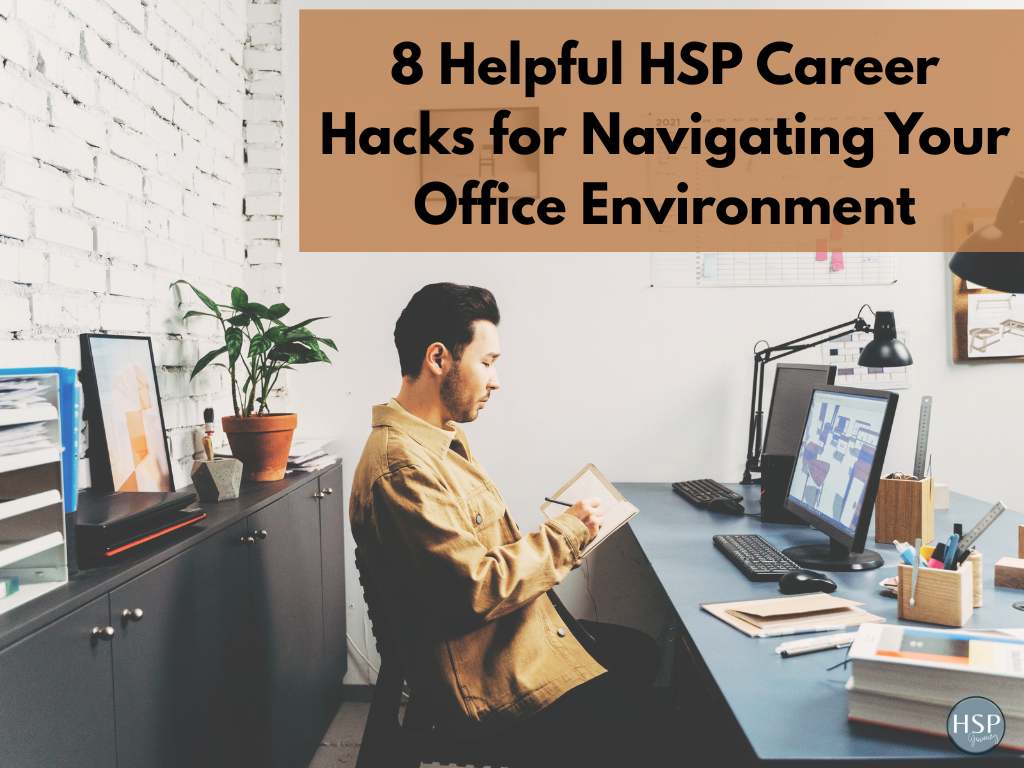Many highly sensitive people (HSPs) find typical work environments overwhelming with noise, constant interruptions, and high stress making it difficult to do their best work. Learning specific HSP career hacks can help protect personal energy and create a more manageable routine at work.
It’s common for HSPs to feel exhausted by busy offices or team settings that demand high levels of social interaction. Tailored strategies make it possible to avoid burnout and maintain a sense of calm, even in fast-paced industries.
This blog post shares practical, effective ideas to support HSPs in building a career that honors their unique needs and strengths. With the right approach, anyone can find more focus, well-being, and satisfaction at work.

Table of Contents
#1 – HSP Career Hacks: Make Your Desk Your Home Away from Home
A desk can either drain or restore energy for highly sensitive professionals. Bringing a sense of comfort and control helps maintain inner peace throughout a busy workday.
Thoughtful additions to the workspace can make a difference:
- Noise-cancelling headphones to minimize background distractions
- A small, low-light plant for a calming touch
- Personal items like a photo, smooth stone, or favorite mug
- Soft, neutral desk lamp to avoid harsh overhead lighting
Keeping unnecessary clutter away is crucial. A tidy environment reduces sources of stress and preserves focus.
It helps to create boundaries with a few simple habits. For example, using a desk organizer or setting aside a short daily break for quiet reflection supports emotional balance.
| Item | Benefit |
|---|---|
| Plant | Improves air and calms nerves |
| Headphones | Blocks noise, aids focus |
| Personal mementos | Promotes comfort |
| Desk lamp | Reduces eye strain |
Making consistent choices about workspace setup allows HSPs to feel secure and grounded, even in shared or open offices. This level of personalization helps protect one’s energy bubble amid workplace demands.
#2 – HSP Career Hacks: Take Short Walks Around Your Building to Get Outside During the Day
Taking short walks outside provides a quick reset for anyone who feels overstimulated during the workday. Even five minutes of fresh air or a brief circuit around the building can help.
Highly sensitive people often benefit from having small breaks away from their office environment. Stepping outside reduces noise and interruptions, supporting a sense of calm.
Benefits of Short Walks:
- Reduces sensory overload
- Encourages mental clarity
- Supports emotional stability
- Offers private time to recharge
It’s helpful to schedule these walks intentionally. For example, one can set reminders after meetings or periods of deep focus.
Sticking to a regular routine reinforces the habit. Avoid bringing a phone to stay present and maintain the benefits of quiet, restorative time alone.
#3 – HSP Career Hacks: Take a Break from Your Desk
Taking regular breaks away from the desk is especially important for highly sensitive people (HSPs). Remaining in the same space for hours can increase mental fatigue and reduce productivity.
HSPs often need quiet moments to reset. A short walk outside, stretching, or simply sitting quietly in another room can refresh focus and restore calm.
Resist the temptation to eat lunch at the computer. Instead, try eating in a different location. This simple habit can make mealtime more restorative.
Benefits of stepping away from your desk:
| Benefit | Description |
|---|---|
| Improved focus | Clears the mind for new tasks |
| Reduced overstimulation | Limits exposure to office noise and interruptions |
| More effective self-care | Supports energy and emotional balance |
Tip: Set a timer to remind yourself to move every hour. Even five minutes can help.
Regular desk breaks support both well-being and job performance for HSPs. Creating space for quiet moments can help maintain a healthy energy balance throughout the workday.
#4 – HSP Career Hacks: Reduce Noise
Highly sensitive professionals often find noise distracting in the workplace. Reducing auditory distractions supports focus and well-being.
Practical steps to minimize noise:
- Ask for a better desk location away from high-traffic areas like break rooms and printers.
- Reposition your desk so that sources of noise, such as open doors or conversation hubs, are behind you.
- Use noise cancelling headphones to block out background sounds during concentration-heavy tasks.
- Inform colleagues about periods when you need quiet, using signals like a desk sign or status indicator.
A simple changes table:
| Adjustment | Impact |
|---|---|
| Switching desk location | Fewer interruptions |
| Move away from a noisy neighbor | Lower volume for sensitive ears |
| Desk repositioning | Lowered exposure to noise |
Identifying the loudest times or areas in the office helps plan work sessions during quieter periods.
Taking regular breaks in calm spaces can also help maintain energy and focus for those sensitive to noise.
#5 – HSP Career Hacks: Plan in Advance for Everything
Highly sensitive people (HSPs) benefit from planning their workdays, tasks, and breaks ahead of time. Structuring the day reduces surprises and helps prevent overwhelm, which can drain energy.
A simple planning routine each morning can help maintain calm. Many HSPs find it useful to review their calendar, set specific goals, and prioritize key tasks. Even planning short breaks can improve focus and comfort.
Key Planning Tips for HSPs:
- Schedule important tasks for when energy is highest
- Identify potential stressors and reduce exposure where possible
- Set realistic goals to avoid burnout
- Include regular, planned breaks to recharge
| Aspect | Planning Method |
|---|---|
| Meetings | Limit to essential ones |
| Breaks | Block into calendar |
| Interruptions | Use “do not disturb” times |
| Workload | Divide into small steps |
Preparation helps in setting boundaries and protecting mental space. Keeping some flexibility in the plan allows HSPs to manage unexpected challenges without added stress.
Maintaining organization and advance preparation are important for conserving emotional and mental reserves. By thinking ahead, HSPs create a stable routine that supports their well-being at work.
#6 – HSP Career Hacks: Keep Remedies Close at Hand
Highly Sensitive Persons often benefit from having practical tools nearby to help manage stress and sensory overload. Simple remedies can make daily work life more comfortable and productive.
A small kit in a desk drawer or bag can include essentials such as pain relievers, herbal teas, and aromatherapy oils. Applying soothing scents, like lavender or peppermint, behind the ears can provide immediate calming effects in overstimulating environments.
Other helpful items might include:
- Cooling eye masks
- Stress-relief fidget tools
- Hydration reminders, such as a water bottle with time markers
| Remedy | Use |
|---|---|
| Pain medication | For headaches and physical discomfort |
| Aromatherapy Oils | Calm nerves and enhance focus |
| Herbal teas | Promote relaxation during breaks |
| Noise-cancelling tools | Block out distracting or overwhelming sounds |
Maintaining personal comfort with these simple strategies makes it easier to preserve calm and focus at work. Consistently keeping remedies within reach can reduce the chance of stress escalation throughout the day.
#7 – HSP Career Hacks: Practice Mindfulness
Mindfulness can help Highly Sensitive Persons (HSPs) maintain a sense of inner peace in daily work situations. By staying present, HSPs are better able to manage stress and avoid emotional overwhelm.
Key mindfulness practices include:
- Deep breathing exercises
- Short, guided meditations
- Taking mindful walks during breaks
Simple breathing technique:
- Inhale slowly through the nose for four seconds
- Hold the breath for four seconds
- Exhale gently through the mouth for four seconds
Using these tools, HSPs can calm anxiety before meetings or challenging conversations. Regular mindfulness practice also helps them recharge their energy and protect their boundaries.
Many people find it helpful to use mindfulness apps or keep a journal to track progress. Some prefer to listen to calming music or nature sounds.
| Mindfulness Tool | Best For |
|---|---|
| Deep breathing | Reducing tension |
| Meditation | Increasing focus |
| Mindful walking | Recharging energy |
| Journaling | Self-reflection |
Staying present makes it easier for HSPs to notice when their energy is getting depleted. Taking a moment for mindful reflection can help them respond thoughtfully, rather than react impulsively.
Integrating even short mindfulness activities into the workday can support an HSP’s need for calm and clarity.
#8 – HSP Career Hacks: Develop Open Communication with Your Manager
Open communication helps highly sensitive professionals (HSPs) set clear boundaries and expectations. By discussing preferences and work styles, misunderstandings can be reduced.
It is useful for an HSP to express their needs directly. For example, if frequent interruptions are overwhelming, they can request blocks of uninterrupted time.
Sample conversation starters:
- “I work best with quiet periods for focused tasks.”
- “Could we set regular check-ins instead of frequent impromptu meetings?”
- “What is the best way to share updates on my work?”
Benefits of proactive communication:
| Benefit | How It Helps |
|---|---|
| Reduces misunderstandings | Clarifies work style and needs |
| Builds trust | Creates a foundation for mutual respect |
| Supports well-being | Allows for adjustments that fit the HSP |
Maintaining an ongoing dialogue encourages understanding. Managers are often willing to make reasonable adjustments when made aware of what helps their team members thrive.
An HSP can preserve their “energy bubble” by setting clear boundaries. This might include explaining when they need quiet time or fewer meetings to keep productivity high.
Open channels of communication give both the employee and manager a way to solve challenges collaboratively. It also supports a work environment that respects individual differences.

Looking for an HSP-Trained coach to help you align your life with your priorities?
Through my Highly Sensitive Person (HSP) certification with the Nickerson Institute, as well as being an HSP, I offer HSP coaching to develop specific goals around your HSP needs. We HSPs frequently deal with anxiety and overstimulated nervous systems that prevent us from achieving peace and attaining our life goals. HSP coaching with me includes a detailed review of your sensitivities and a mutually-desired plan for growth and management of this superpower to shift negativity and begin seeing yourself as the hero of your own story. (Affordable monthly coaching begins at $150/month.)
Frequently Asked Questions
Choosing the right work setting, understanding practical self-care, and communicating clearly can help Highly Sensitive Persons (HSPs) maintain workflow and reduce overwhelm. With the right approach, HSPs can create a sustainable and comfortable professional life.
What types of work environments are best suited for Highly Sensitive Persons?
HSPs often do well in calm, quiet, and predictable environments. Settings with low noise, minimal interruptions, and clear boundaries can help them focus and recharge.
Remote or hybrid work, private offices, and flexible scheduling are often more comfortable than crowded or high-pressure open spaces.
How should Highly Sensitive Persons negotiate workplace accommodations for their sensitivity?
They can begin by documenting specific stressors and identifying solutions, such as noise-canceling headphones or flexible hours. Requesting accommodations in writing and linking them to increased productivity can make conversations with management smoother.
Identifying existing company policies or government protections can also support their request.
What self-care practices are essential for Highly Sensitive Persons to maintain productivity at work?
Short, regular breaks throughout the day help prevent sensory overload. Using relaxation techniques, such as deep breathing or short walks, can restore calm.
HSPs should set clear work-life boundaries and create a calming workspace. Taking time to decompress after work is also beneficial.
How can Highly Sensitive Persons effectively communicate their needs to co-workers and management?
Clear, direct language about personal limits or needs is important. They should explain how certain changes would help them work better, without making emotional appeals.
Scheduling regular check-ins with supervisors can maintain open communication. Setting boundaries around interruptions and workload supports ongoing productivity.
Be sensitive, be free
*This post contains affiliate links and I will be compensated if you make a purchase after clicking on my links*





[…] highly sensitive LGBTQ+ loved one has probably spent a lot of time feeling like they’re too different, too […]